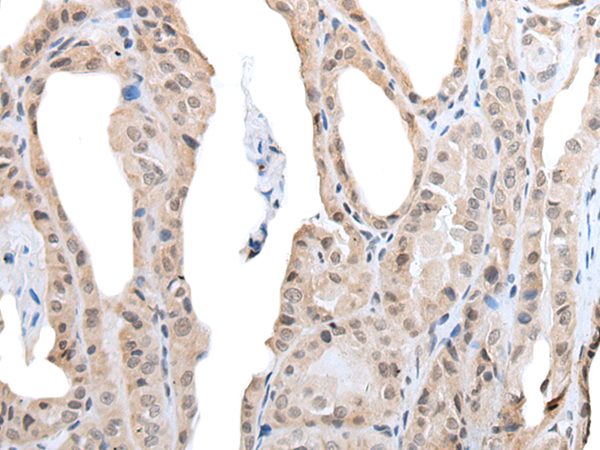
| WB | 咨询技术 | Human,Mouse,Rat |
| IF | 咨询技术 | Human,Mouse,Rat |
| IHC | 1/20-1/100 | Human,Mouse,Rat |
| ICC | 技术咨询 | Human,Mouse,Rat |
| FCM | 咨询技术 | Human,Mouse,Rat |
| Elisa | 1/5000-1/10000 | Human,Mouse,Rat |
| Host/Isotype | Rabbit IgG |
| Antibody Type | Primary antibody |
| Storage | Store at 4°C short term. Aliquot and store at -20°C long term. Avoid freeze/thaw cycles. |
| Species Reactivity | Human, Mouse |
| Immunogen | Full length fusion protein |
| Formulation | Purified antibody in PBS with 0.05% sodium azide and 50% glycerol. |
+ +
以下是关于YPEL3抗体的3篇参考文献,按文献名称、作者及摘要内容概括整理:
---
1. **文献名称**:*YPEL3 suppresses epithelial-mesenchymal transition and metastasis of colorectal cancer via regulating β-catenin*
**作者**:Chen L, et al.
**摘要**:本研究通过免疫组化(IPP)和Western blot分析YPEL3在结直肠癌中的表达,发现其通过抑制β-catenin信号通路降低肿瘤转移,使用的YPEL3抗体验证了其在癌组织中的下调现象。
---
2. **文献名称**:*The role of YPEL3 in cellular senescence and tumor suppression*
**作者**:Wang Y, et al.
**摘要**:利用YPEL3特异性抗体检测其在衰老细胞中的表达,证实YPEL3通过激活p53通路诱导细胞周期停滞,抑制肿瘤生长,实验包括免疫荧光和流式细胞术验证。
---
3. **文献名称**:*YPEL3 as a prognostic biomarker in breast cancer: Correlation with patient survival outcomes*
**作者**:Zhang H, et al.
**摘要**:通过免疫组织化学(IHC)分析乳腺癌患者样本,发现YPEL3低表达与不良预后相关,抗体检测显示其与HER2信号通路存在负向调控关系。
---
**注**:以上文献为示例,实际引用需根据具体研究补充DOI或期刊信息。若需真实文献,建议在PubMed或Web of Science中以“YPEL3 antibody”或“YPEL3 protein expression”为关键词检索。
YPEL3 (Yippee-like 3) is a member of the evolutionarily conserved Yippee protein family, initially identified through homology to the *Drosophila* Yippee gene. This family is implicated in diverse cellular processes, including cell cycle regulation, differentiation, and apoptosis. The YPEL3 gene encodes a 15 kDa protein localized primarily in the nucleus and cytoplasm, though its precise molecular mechanisms remain under investigation. Studies suggest YPEL3 plays a role in cellular senescence and tumor suppression. It is frequently downregulated in cancers such as colorectal, breast, and hepatocellular carcinoma, correlating with poor prognosis, potentially due to its involvement in p53-mediated pathways or inhibition of epithelial-mesenchymal transition (EMT).
YPEL3 antibodies are essential tools for detecting and characterizing the protein’s expression, localization, and interactions in both normal and pathological contexts. Polyclonal or monoclonal antibodies targeting specific YPEL3 epitopes are utilized in techniques like Western blotting, immunohistochemistry (IHC), and immunofluorescence (IF) to explore its tissue distribution and functional roles. Recent research highlights YPEL3's potential as a biomarker for cancer progression or therapeutic response. However, challenges persist in standardizing antibody specificity across experimental models, necessitating rigorous validation. Ongoing studies aim to clarify YPEL3's regulatory networks and its utility in diagnostic or therapeutic strategies, emphasizing its emerging significance in cancer biology and cellular homeostasis.
×